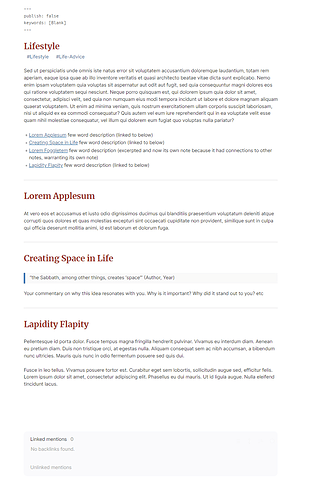I’ve been at this for a little while, but I’m still struggling with the concept of atomic notes and how to most effectively organize and interlink things. My current process (predating Obsidian) is that when I take notes from a book I make them all in a single file but as almost a bulleted list. So each note is its own little paragraph, but they’re all in a single note with the name of the book, etc. In Obsidian I can also enter headings to section them out and, on occasion, if one seems to warrant its own separate note, I’ll pull it out to a new note and leave a link to the new note as a placeholder.
What I’m getting stuck on is that some things seem too brief to warrant a full note, but then I’m not sure what to do with them.
If I lay out my current use case, could someone walk me through how you would handle this if it were your data in your vault?
Book #1: I read a book called Essentialism. One of the tenets this book talked about was “space” – as in, leaving space in your life/schedule. This stuck in my mind; however, the only actual note I made of this within my Essentialism note was “the Sabbath, among other things, creates ‘space’.”
This doesn’t seem to warrant a whole note, although it would logically link to/from notes about Sabbath.
Book #2: I’m now reading a book called Delighted, about youth ministry. It has a line I’ll pull out for my notes on this book that says, “There is no faster way to forget to celebrate than overscheduling. Even spontaneous celebration is less likely to erupt if there is no space to do so.”
Obviously, this concept connects to the “space” concept from the first book. But I’m not sure what to do with it. If I make this line a note, and the snippet about the Sabbath a note, and all of my notes are set up that way, I’m quickly going to have tens of thousands of notes that are like 10 words long, and it’s going to feel messy to me since most of them were in the book notes to begin with. (I already have about 8000 notes as it is, without breaking most of them out from their book notes.) I could theoretically link to the heading in the Essentialism note, but the problem there is that, going forward, there’s no way to give it an Alias or anything and every single link back will have to be manually aliased.
Part of me feels like I’m overthinking this, but part of me feels like if I can’t get my head around how to manage the right degree of atomization, I’m going to have a constant struggle.
So…what would you do?
